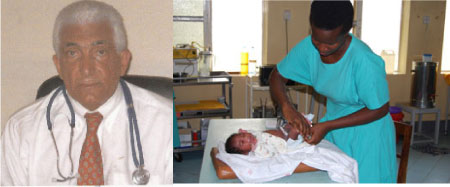
Gambia needs urgently more Midwives than ever before
“Midwives deliver – and not only babies, they save lives and promote good health in societies as a whole. They are an essential workforce in an effective health-care system.”
United Nations officially hailed the significant impact of midwives on the health of women and newborns, and called for greater investment to ensure their life-saving services are available to all who need them around the world.
Dr Azadeh, our health adviser, a senior lecturer at the University of the Gambia and a senior consultant in Obstetrics & Gynaecology explains the vital rule of Midwives in Ante-natal care, care for mothers during the labour and care of new born babies in the health services throughout the country
The Point - What does Midwifery mean?
Dr Azadeh - Midwives are specialists who are dedicated to promoting the health of pregnant women and babies. The World Health Organization recognizes the importance of midwives and endorses them as the primary health care providers for pregnant women all over the world.
As the world celebrates another International Midwives’ Day, just as it was first celebrated on the 5th of May 1991, it is important that we again look into the significance of midwives in our hospitals, communities, and especially in the most remote villages. There has been measurable success with midwife-led maternal care at safeguarding and improving the survival chances of pregnant women and babies.
In general, there are three categories of midwives all over the world: those with formal training who have attained one form of education or the other but have not necessarily been trained in the field of nursing; nurse-midwives who after having completed the required nursing program, go on to take courses in midwifery; and finally, local women who practice in villages and remote areas, who in most cases have not had any formal education.
However, it’s important to note that they all play a vital role in promoting the health of pregnant women and babies in the respective societies they belong. And we all should be glad that the world has taken a day off to acknowledge these unsung heroes who have helped to successfully usher us into the world with their committed and dedicated hands.
Midwifery encompasses care of women during pregnancy, labour (child birth) and the period after labour as well as care of the newborn. It includes measures aimed at preventing health problems in pregnancy, the detection of abnormal conditions, the procurement of medical assistance when necessary, and the execution of emergency measures in the absence of medical help.
Midwifery services are key to a healthy and safe pregnancy and childbirth. Worldwide, approximately 287 000 women die every year due to pregnancy and childbirth related complications. Most of these largely preventable deaths occur in low-income countries and in poor and rural areas. WHO supports countries’ efforts to make sure that every women and every newborn baby receive the best possible health care.
Many maternal and newborn deaths can be prevented if competent midwives assist women before, during and after childbirth and are able to refer them to emergency obstetric care when severe complications arise.
The International Day of the Midwife was marked on May 5. The International Confederation of Midwives (ICM) hosted the Virtual Day of the Midwife, a 24-hour series of presentations to mark the date. Midwives, advocates, researchers and others spoke on topics related to midwifery practice and policy around the world and recordings of their presentations are now posted online.
However, the May 5 events were only the beginning. The celebration will continue for a few more days as organizations around the world to make space for considering the vital ways that midwives contribute to the health and well-being of mothers and children everywhere.
10 facts on midwife
Competent midwives decrease the risk of dying during childbirth
About 800 women and more than 8000 newborns die every day due to largely preventable complications during pregnancy, childbirth and the immediate postnatal period. In addition, every year, nearly 3 million babies are stillborn. Many of these lives could be saved if every birth were attended by a midwife
More than one third of all births take place without a midwife or other skilled health staff
Millennium Development Goal 5 (MDG 5) aims to improve maternal health. More midwives need to be trained to achieve the MDG 5 target to increase the number of births attended by skilled health personnel to 95% by 2015.
Midwives also provide essential care after birth
After childbirth, midwives support mothers to breastfeed and to prevent mother-to-child-transmission of HIV. They check the health of the newborn and also counsel the mother on newborn care, birth spacing and family planning.
Only one in three rural women in developing areas receives necessary care
During pregnancy and childbirth, women in rural areas, remote districts and smaller health facilities in particular suffer from a lack of midwives and health personnel with midwifery skills serving their communities. Therefore, countries need to improve distribution and retention of midwives, especially in poor and remote areas.
Midwives need regular refresher training and support
They need training to acquire and maintain competencies to provide high quality care to women and newborns. In addition to providing opportunities for midwives to update their skills, governments need to adopt policies that allow midwives to use their full knowledge and expertise in communities, health centres and hospitals.
Working in teams with the necessary supplies is essential for midwives
Midwives need more than just training to be successful. In order for them to provide high quality care they also need adequate infrastructure, readily available drugs and supplies, water and sanitation, communication, and a functioning referral system if complications arise during childbirth.
Reliable data on the numbers of practicing midwives are scarce
We do not know how many trained staff are actually working in the delivery room and how the workforce is distributed within regions and countries. This information is needed to develop targeted national plans and programmes.
Many trained midwives leave their home countries to work abroad
Countries often have difficulties retaining trained personnel due to difficult working conditions, poor remuneration, support and supervision and a lack of career paths. Many trained midwives work abroad for better salaries and more favourable working conditions. This creates a dearth of skilled staff in countries that need them most.
WHO advises countries on how to support midwives
WHO works with countries to ensure that midwifery issues are addressed in national health strategies and plans. WHO encourages countries to better recognize midwifery as a profession and support midwives as an essential pillar of the maternal and newborn healthcare workforce.
According to recent estimates, countries require a minimum of six health workers with midwifery skills per 1 000 births to make sure that 95% of women are attended during childbirth and to accelerate the reduction of maternal and newborn mortality. WHO supports countries to address the shortage of health workers.
In a statement to mark the International Day of the Midwife, Dr. Osotimehin noted that more than one in three women in developing countries give birth alone, and in some of the poorest countries, as few as 13 per cent of all deliveries are assisted by a midwife or a health worker with midwifery skills.
UNFPA estimates that 1,000 women die every day and 5,500 newborns die in the first week of life for lack of adequate medical care and investing in human resources to tackle the current global shortage of some 350,000 of these “unsung heroes” of maternal and newborn health.
UN World Health Organization (WHO) noted in her statement that midwives are essential to the delivery of quality health services before, during and after childbirth for women and newborns.
“Despite this vital role in improving maternal and newborn health, recent analyses indicate that midwives and midwifery services are unequally distributed both between and within countries,” she said.
“Direct investment in midwifery education, regulation and association will create the necessary conditions for the midwifery profession to achieve its full potential.”
Who could be a Midwife
A midwife is a person who, having been regularly admitted to a midwifery educational program “in the Gambia at the School of Nursing and Midwifery” that is duly recognized in the country in which it is located, has successfully completed the prescribed course of studies in midwifery and has acquired the requisite qualifications to be registered and/or legally licensed to practice midwifery.
The midwife is recognized as a responsible and accountable professional who works in partnership with women to give the necessary support, care and advice during pregnancy, labour and after birth period, to conduct births on the midwife’s own responsibility and to provide care for the infant.
This care includes preventive measures, the promotion of normal birth, the detection of complications in mother and child, accessing of medical or other appropriate assistance and the carrying out of emergency measures.
The midwife has an important task in health counselling and education, not only for the woman, but also within the family and community. This work should involve antenatal education and preparation for parenthood and may extend to women’s health, sexual or reproductive health and childcare, and to gain the knowledge to counteract the lack of pain relievers and antiseptics.
A midwife may practice in any setting including in the home, the community, hospitals, clinics or health unit.
Midwives in Africa and Gambia no exception
There’s no doubt that Africa needs more midwives than ever before, considering the fact that there is an increasing demand on the entire continent on delivering the 2015 Millennium Development Goals.
As the deadline for the MDGs is fast approaching, and if African nations must realize these goals, it is essential that the continent acknowledge the important work midwives around the continent are doing. We need to creatively look for ways to increase support for them with more funding so they can actually save more lives.
Considering the poverty level of many African nations, they need to support midwife led care and recognize it as an effective tool in achieving the 2015 MDGs and post 2015. As the primary providers of antenatal and postpartum care in most low and middle-income countries, midwives can be a cost-effective means to tackling the prevalent maternal and newborn mortality in the continent.
A report on midwife-led care in five countries, published by Support Summaries, revealed that the use of midwife-led care may reduce costs when compared to medical-led care, thus improving the delivery of health services to women and babies. The report also provided evidence that in cases of limited resources, midwives provide an affordable alternative to medical care with equivalent outcomes.
Along with being cost-effective, the midwife-led model assures continuity of care as well as the constant examination of mother and child’s physical, psychological and total wellbeing. With midwife-led care, counselling expectant women on antenatal care, immunization and also the importance of breast feeding becomes much easier. Midwife-led care also increases a woman’s chances of becoming familiar with her midwife, such that she feels more relaxed and in control during labour.
Community midwives
Many midwives also work in the community. The role of community midwives includes the initial appointments with pregnant women, managing clinics, after birth care in the home, and attending home births. Community midwife would typically have a pager and be responsible for a particular area, contacted by ambulance control when needed. Sometimes they are paged to help out in the hospital when there are insufficient midwives available.
You can find further information about Midwifery at the “School of Nursing and Midwifery in Banjul”, send e–mail to azadehhassan@yahoo.co.uk or send text to 7774469 or call Dr Azadeh during working days from 3-6pm on 7774469.


